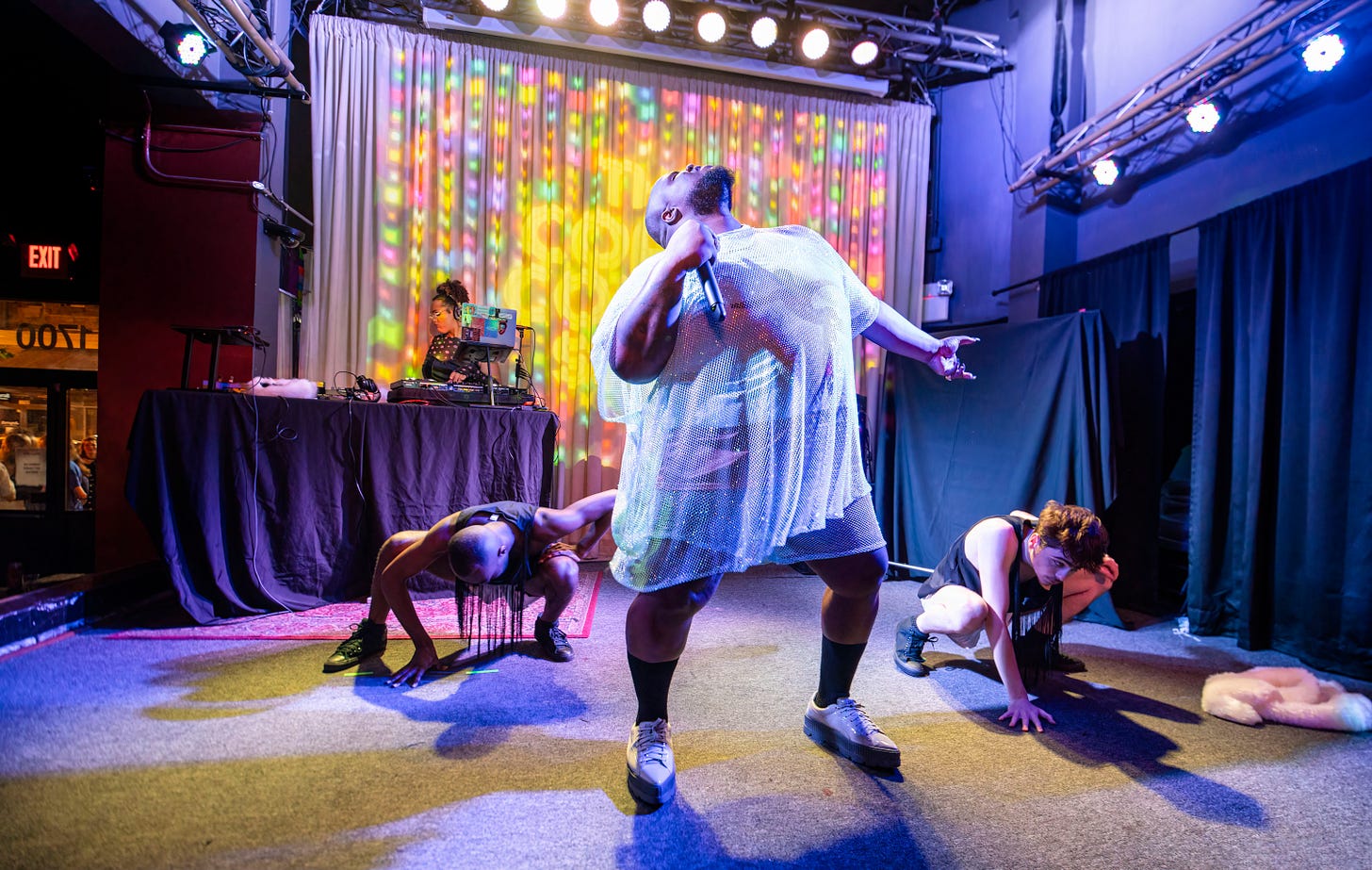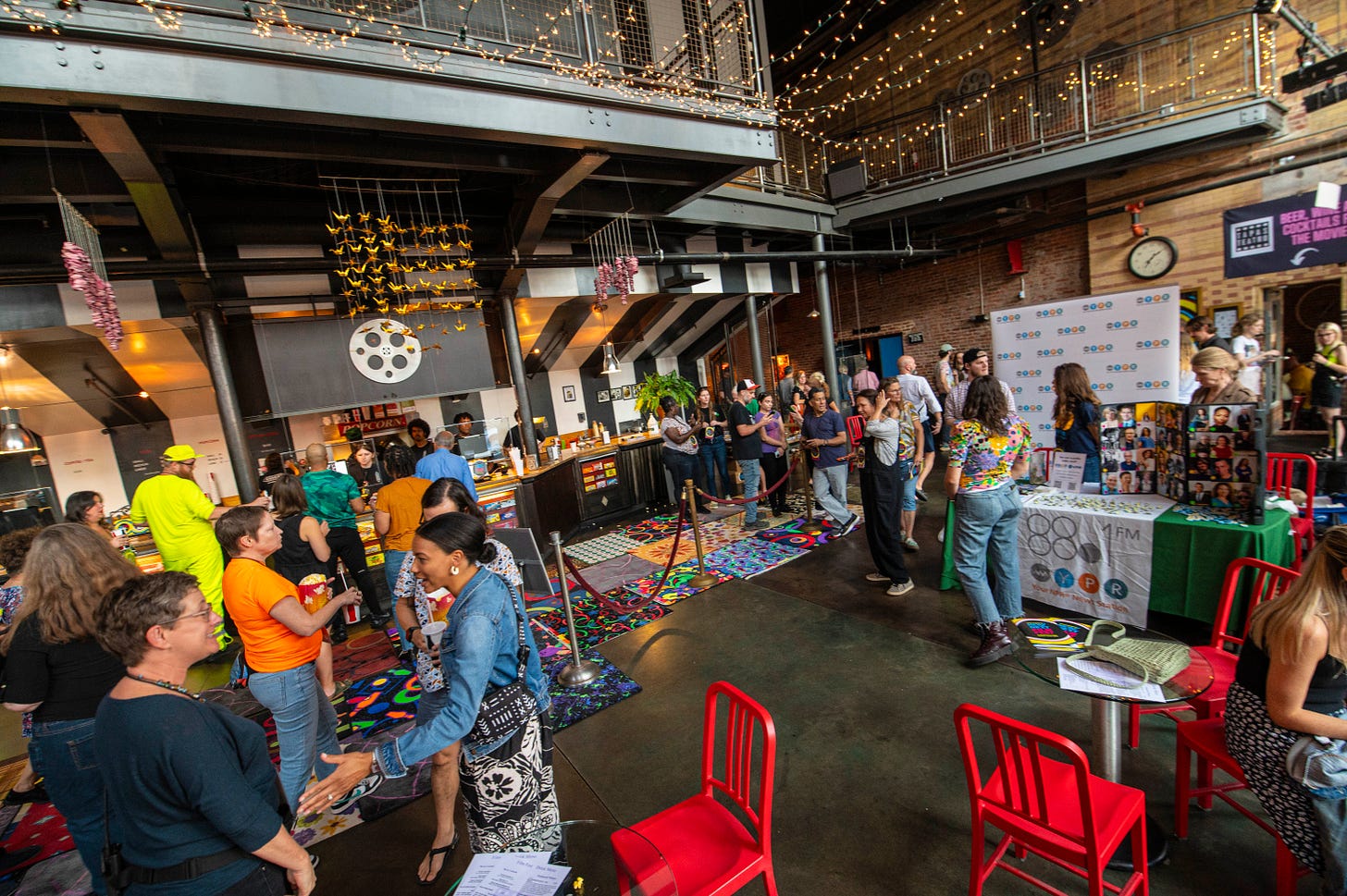The Vibes Were Good, So New/Next Is Back
Eric Allen Hatch on what's new and next in filmmaking, the Baltimore film scene, and what he's stoked to premiere in year two of New/Next Film Festival.
Hello! Welcome to Nothing Bogus, an Indie Film Listings+ newsletter. The + is commentary, interviews, dispatches, tutorials, and other groovy stuff. I’m going to start with the +. If you subscribed for the listings and only the listings, scroll as fast as you can to the bottom of this email. If you came for the +, no scrolling necessary :)
Last year, when Eric Allen Hatch put together the first New/Next Film Festival in Baltimore, the intention was for the event to be a one-off. The festival came about after the Maryland Film Festival — which Hatch worked for, as Director of Programming, from 2007 to 2018 — announced that it wouldn’t hold its 2023 edition. Sam Sessa, the Events Coordinator at WTMD and WYPR, called up Hatch and proposed they create a festival to fill the void. “Three months after our initial call, we announced that New/Next was happening, and then we had another three to four months to make a three day, five screen film festival happen,” says Hatch.
Given the condensed timeline under which the festival was created, everything went remarkably smoothly — so smoothly, in fact, that Hatch and the festival’s presenting sponsors, Baltimore Public Media, decided that they’d bring it back regardless of whether the Maryland Film Festival returned in 2024 (which it did).
When Hatch left Maryland Film Festival in 2018, the split was contentious. He’d become frustrated and disillusioned with the path its board of directors had taken it. So, the greatest compliment he received after last year’s New/Next was from filmmakers and audience members who remembered the early, Halcyon days of his time at Maryland Film Festival. “They were saying, ‘This feels like that again,’” Hatch says. “‘This is the first festival we've been to in X number of years where it feels like this temporary utopia community that we're getting to access; where the art of filmmaking is being prioritized; filmmakers are being treated well; audiences are coming out in large numbers with great questions; and everything feels like this pure celebration of film and video.’"
In the following interview, Hatch discusses the factors that contributed to the good vibes, what characterizes the Baltimore film scene, and a few of the titles he’s most excited to show at this year’s festival.
What were some of the things you wanted to replicate from Maryland and what were some of the things you wanted to do differently?
At Maryland, I always put a special emphasis on diverse and emerging voices, first films, filmmakers who are working in the short film space. That's always the most exciting thing to me. I don't like to celebrate the already celebrated. I like to find things while they're fresh. While I'm holistic and omnivorous in my love of film and certainly have seen a lot of the franchise films and such, as a festival programmer I really want to be dedicated to finding the new.
One aspect of Maryland Film Festival I didn't replicate is the panels and conferences. New/Next was just movies and parties. And as far as campus goes, we were under one roof, using the whole of the Charles Theater, which has five screens. And all of our other events, the parties and filmmaker lounge, were on the same block. And I really love that. Maryland had that in its early days. It used to happen at the Charles Theater. But when that relationship went askew and Maryland built its own theater and had a transition period where they sort of had a campus all over the city, some of that center of gravity was lost. And I think some audience, too. When everything's in one theater you can see three or four movies in a day and still have meals and take a walk and socialize. Whereas if you have to zip around town, everything feels a little more strained and hectic and you're probably going to see fewer movies.
You mentioned being excited about finding the new. You've been doing this for a long time. Over the past few years, what do you see as being new in what's new?
I think that film culture always renews itself and there's always new energy there. And the differences can be small if you're not really in the trenches with it. I don't know if this is completely applicable but I think of a quote from John Waters often where he essentially says "If you want to be a rebel, don't go after your parents' generation. Go after the cool kids five years older and do something that's different and better than what they're doing." And I think there is a film scene that's bringing that energy. Whatever their vision of what 2015 or even 2020 cinema looked like, they're attacking it in their own way and building something new.
But as far as any specific trends, I think that really the most exciting thing about cinema, and even society, right now is that even though politically we seem to be in such a dark time, culturally things seem sort of wide open. And there's so much representation, whether it's people of color or trans people. People who weren't able to tell their stories are able to do so more and more. And that just makes everything more interesting. There were so many years of film history where the type of person who could get behind a camera and tell a story felt kind of monolithic and homogenous and then there was a transitional period where film festivals and very DIY underground cinema were interrogating that idea and making changes, but the marketplace hadn't caught up. And there's still a lot of work for festivals and the marketplace to do. But the work that an adventurous viewer or film programmer can see now is so much more diverse than it used to be.
When you talk about filmmakers attacking a 2015 to 2020 film culture, what does that film culture look like to you? And how are they pushing against it?
There was a period where just because of technological innovations you had the very raw DV era of, for lack of a better word, the mumblecore “movement.” That was maybe a 2005 to 2012 kind of thing. And then there was this period where I think technology advanced so quickly that everyone was going digital and everyone was trying to visually replicate the beauty that cinema had traditionally conveyed on film. And this isn't monolithic. But a lot of people could do this for the first time, so a lot of people were doing that. And I think that now there's sort of two things happening simultaneously. One is that people are exploring different kinds of beauties you can only access through digital — because we've seen we can make a film that produces Terrence Mallick kind of effects on digital now (not saying the quality is completely the same). But what can you do with digital that you could never do with film? I think some people are starting to find some answers to that.
And I think some people are also dipping into the past. A lot of people are making films shot in outmoded technologies or shooting in 16mm and trying to find their own voice and stand out with different modes of production that would otherwise perhaps fall by the wayside.
Do you have examples of films that are doing things with digital that you could only do with digital?
Any film shot by Sean Price Williams that is not on film. I think there are certain people who have an eye and an intuitive sense of what different kinds of cameras and lenses can achieve that can be really liberated by something like how many pixels there are in the best digital cameras in the world. I think Sean is one of those people.
In 2018, you wrote about why you were feeling hopeful for Filmmaker Magazine. I'm curious if you look back at that, what's changed in your thinking in terms of where things are at right now?
I think that my positions and outlook haven't changed all that much. In that essay, when I was speaking on a personal level, I was saying I would never work for an organization where I don't know the money people and the board members personally. That happened to me in Maryland and in the end it was a disaster. And I had to compromise that a lot just to stay alive and make a living as a film programmer for a few years there. But my belief that you should work with people who are passionate about film and are good at the job never wavered. And now I'm able to do it for the first time and it's as wonderful as I thought it would be.
As far as the state of film as an art and commerce, the marketplace is clearly falling apart and corporations keep making the wrong decisions. But the art form is arguably more vibrant than it's ever been. So there's that disconnect there. And that's where a good film festival can come in handy. Because if you're bored by what you're seeing, you need an event to recharge and remind yourself, "OK, what I see at the multiplex isn't the truest reflection of what people want to say and the beauty they want to put up on screen these days."
I've been struck by how these last few years these mini festivals or events like yours and the L.A. Festival of Movies have been popping up and celebrating what is cool and next. How do you see a local film festival being able to ripple outward and make waves?
Keep reading with a 7-day free trial
Subscribe to Nothing Bogus to keep reading this post and get 7 days of free access to the full post archives.





